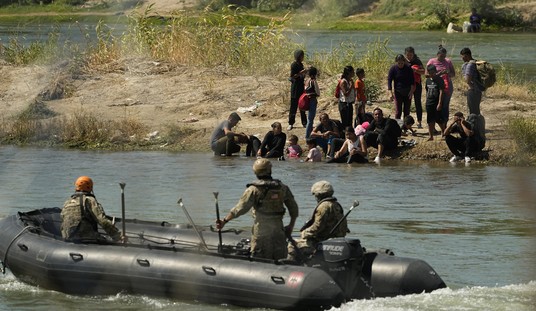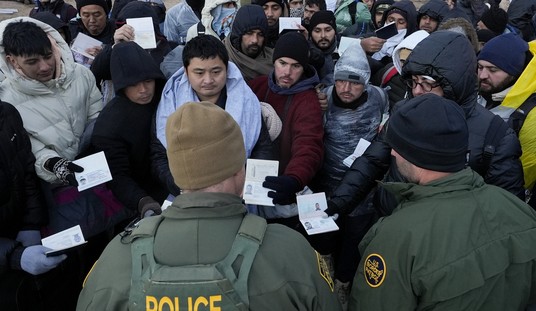When Barack Obama pulled the last American troops from Iraq in 2011 after shrugging off advice to keep a significant force on hand, he took credit for ending the war. Obama continued to brag about keeping his promise to get all combat troops out of the country, and during one of the 2012 presidential debate affected offense when Mitt Romney suggested that Obama had wanted to keep troops in the country. By this summer, Obama claimed that he had been powerless to keep troops in Iraq, and that the Iraqis didn’t want US combat forces on the ground in the country anyway. Even that was disingenuous; both Robert Gates and Leon Panetta believe that the Iraqis were open to a significant residual force, but Obama couldn’t be bothered to engage on the negotiations.
And even if that was true, it’s not now. The Anbar leaders who are still partnering with the central government in Iraq warn that the entire province will fall unless the US gets boots on the ground — and quickly:
The situation in Anbar Province is “very bad,” Sabah Al-Karhout, the president of the Anbar Provincial Council, told CNN by phone Saturday.
Al-Karhout says they have intelligence that ISIS has dispatched as many as 10,000 fighters to Anbar from Syria and Mosul.
The deputy head of the Anbar provincial council, Falleh al-Issawi, told CNN that it had asked the central government for immediate intervention to save the province from imminent collapse — and to request the deployment of U.S. ground forces there.
It’s a significant shift, since the Iraqi government has until now been adamant that it does not want U.S. forces on the ground.
ISIS are now in control of 80% of Anbar province and if its fighters seize the rest of the province, their territory will extend from Raqqa in Syria to the perimeters of Baghdad in Iraq, al-Issawi said.
Iraqi army forces and Anbar tribesmen fighting alongside them against ISIS have threatened to abandon their weapons if the U.S. military does not intervene to help them, he said, because they are starting to give way before the ISIS onslaught.
The army soldiers are not capable of defending themselves against the ISIS militants because of a lack of training and equipment, he said. And already, some 1,800 tribesmen in the province have been killed and injured in the struggle.
The issue is not just acute at the moment, but critical. Once ISIS consolidates its hold on Anbar, their next strategic target will obviously be Baghdad. That seizure will be more difficult for ISIS to accomplish, in no small part because of the two million or so Shi’ites that live in and around the city. Anbar mainly consisted of Sunnis, many of whom joined forces with ISIS, and religious and ethnic minorities unable to defend themselves. The battle for Baghdad, once it begins, will be ferocious, brutal, and probably unending.
If Baghdad falls, or even while it’s paralyzed with battle with no clear winner emerging, the concept of a united Iraq will die along with it. The Shi’ites will either seize it all or retreat in the direction of Basra, fortifying their own territory with the help of the Iranians. With the political and geographic center of Iraq either up for grabs or in ISIS hands, their army can turn in practically any direction, and may start looking south toward Mecca and Medina.
The situation in Syria isn’t much better, the Washington Post reports, and neither is morale:
The U.S.-led air war in Syria has gotten off to a rocky start, with even the Syrian rebel groups closest to the United States turning against it, U.S. ally Turkey refusing to contribute and the plight of a beleaguered Kurdish town exposing the limitations of the strategy.
U.S. officials caution that the strikes are just the beginning of a broader strategy that could take years to carry out. But the anger that the attacks have stirred risks undermining the effort, analysts and rebels say.
The main beneficiary of the strikes so far appears to be President Bashar al-Assad, whose forces have taken advantage of the shift in the military balance to step up attacks against the moderate rebels designated by President Obama as partners of the United States in the war against extremists. …
“Everyone is angry with the airstrikes. For three years we have been asking for support, and now the West decides to hit only the Islamic State?” said Abu Wassim, a rebel fighter in the northern province of Idlib. The strikes are weakening the Islamic State, he said, but “empowering the regime.”
The air strikes aren’t having a big impact on ISIS anyway. In Raqqah, foreign fighters have moved out of the suburbs where they could be easily targeted and into apartments in the city. They’ve stopped driving military vehicles, which means that they are not providing as many targets to US-led coalition pilots. In other words, our moderate-rebel partners aren’t seeing much of a trade-off in having the US attack ISIS while leaving the Assad regime to benefit from the power vacuum.
The fantasy of a long-distance attack having any real impact on ISIS will collapse soon, even at the White House. Let’s hope that it doesn’t take the fall of Baghdad to complete that process. If we do indeed need to “degrade and destroy” ISIS, what we are doing now is not getting the job done.








Join the conversation as a VIP Member